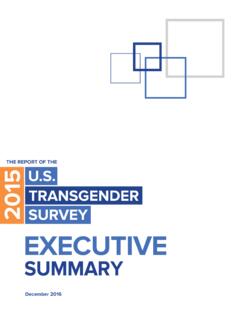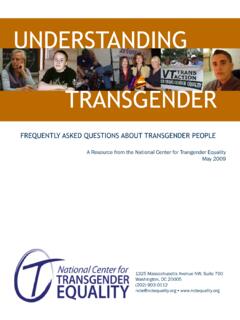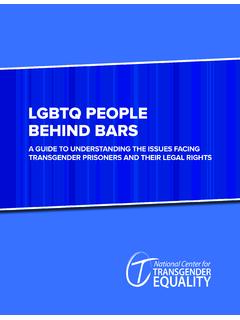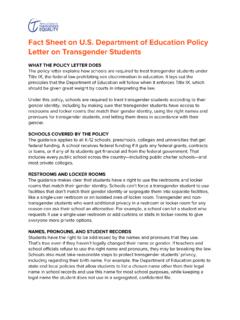Transcription of THE REPORT OF THE - National Center for Transgender Equality
1 THE REPORT OF THEA bout the National Center for Transgender EqualityThe National Center for Transgender Equality (NCTE) is the nation s leading social justice policy advocacy organization devoted to ending discrimination and violence against Transgender people. NCTE was founded in 2003 by Transgender activists who recognized the urgent need for policy change to advance Transgender Equality . NCTE now has an extensive record winning life-saving changes for Transgender people. NCTE works by educating the public and by influencing local, state, and federal policymakers to change policies and laws to improve the lives of Transgender people. By empowering Transgender people and our allies, NCTE creates a strong and clear voice for Transgender Equality in our nation s capital and around the country.
2 2016 The National Center for Transgender Equality . We encourage and grant permission for the reproduction and distribution of this publication in whole or in part, provided that it is done with attribution to the National Center for Transgender Equality . Further written permission is not CITATIONJ ames, S. E., Herman, J. L., Rankin, S., Keisling, M., Mottet, L., & Anafi, M. (2016). The REPORT of the 2015 Transgender survey . Washington, DC: National Center for Transgender REPORT of the 2015 Transgender Surveyby: Sandy E. James Jody L. HermanSusan RankinMara Keisling Lisa MottetMa ayan AnafiDecember 2016 Acknowledgements ..1 Executive Summary ..3 Chapter 1: Introduction ..18 Chapter 2: Methodology.
3 21 Chapter 3: Guide to REPORT and Terminology ..39 Chapter 4: Portrait of USTS Respondents ..43 Chapter 5: Family Life and Faith Communities ..64 Chapter 6: Identity Documents ..81 Chapter 7: Health ..92 Chapter 8: Experiences at School ..130 Chapter 9: Income and Employment Status ..139 Chapter 10: Employment and the Workplace ..147 Chapter 11: Sex Work and Other Underground Economy Work ..157 Chapter 12: Military Service ..166 Chapter 13: Housing, Homelessness, and Shelter Access ..175 Chapter 14: Police, Prisons, and Immigration Detention ..184 Chapter 15: Harassment and Violence ..197 Chapter 16: Places of Public Accommodation and Airport Security ..212 Chapter 17: Experiences in Restrooms ..224 Chapter 18: Civic Participation and Policy Priorities.
4 231 About the Authors ..241 Appendix A: Characteristics of the Sample ..243 Appendix B: survey Instrument (Questionnaire) ..250 Appendix C: Detailed Methodology ..291 Table of ContentsACKNOWLEDGEMENTS1 The REPORT authors extend our gratitude to all the members of the Transgender community who participated in the 2015 Transgender survey and the hundreds of individuals and organizations that made this survey REPORT following individuals in particular are recognized for their contributions during one or more stages of the process, including survey development, implementation, distribution, data preparation and analysis, and reporting:Osman AhmedM. V. Lee BadgettKellan BakerGenny Beemyn Aaron BelkinWalter BocktingKyler BroadusDavid ChaeCecilia ChungLoree Cook DanielsKerith ConronRuby CoradoAndrew CrayKate D AdamoLaura DursoJake EleazerGary J.
5 GatesJaime GrantEmily GreytakAnn HaasJack Harrison-QuintanaMark HatzenbuehlerDarby HickeyLourdes Ashley HunterChai Jindasurat JoAnne KeatleyElliot KennedyPaul LilligEmilia LombardiJenifer McGuireIlan MeyerShannon Price Minter Aaron MorrisAsaf OrrDylan OrrSari ReisnerGabriel RodenbornShelby RoweBrad SearsJama SheltonJillian ShipherdSharon StapelMichael SteinbergerCatalina VelasquezBianca Wilson The authors extend special gratitude to the following individuals for their contributions to the project:Ignacio Rivera, survey Outreach Coordinator, for leading the survey outreach efforts and building a network of individuals and organizations that led to the unprecedented levels of participation in this survey . Andrew Flores for assistance with questionnaire development and the weighting procedures to prepare the data for analysis.
6 Daniel Merson for continued work in cleaning the data set, re-coding the data, and providing population numbers for comparative purposes in the final REPORT . Michael Rauch for programming and implementation of the complex is also extended to NCTE interns, law fellows, staff, and volunteers who assisted with the project, including outreach across the country, development of outreach materials, and translation:Bre KidmanCyres GibsonMati Gonzalez GilRomeo JacksonKory MasenImari MoonCullen O KeefeNowmee ShehabAcknowledgements2015 Transgender SURVEY2A special thanks is also extended to USTS Interns, Fellows, and Assistants for their work at various stages of the project:Rodrigo Aguayo-RomeroWillem MillerShabab MirzaDavida SchifferJeymee SemitiDanielle StevensVenus SeleniteThe authors also thank the USTS Advisory Committee (UAC) members, who devoted their time to the project by giving valuable recommendations around project development and community outreach:Danni AskiniCherno BikoThomas CoughlinBrooke Cerda GuzmanTrudie JacksonAndrea JenkinsAngelica RossNowmee ShehabStephanie SkoraBrynn Tannehill Additional acknowledgement goes to the more than 300 Transgender , LGBT, and allied organizations that promoted and distributed the survey to its members throughout the country for completion.
7 The authors also acknowledge current and former NCTE staff for their work on the project, particularly:Theo George and Vincent Villano for their pivotal work in survey project development and distribution through their respective roles in digital media and communication strategy. Arli Christian, Joanna Cifredo, K ai Smith, and Harper Jean Tobin for their contributions as REPORT co-writers, including lending their subject-matter expertise and analysis to the findings included in this individuals and firms assisted in spreading the word about the survey , both prior to and during the data collection phase, and they also assisted with survey translation, design, and reporting. Thanks goes to: Sean CarlsonLeah FurumoMolly HaighAnna ZuccaroDesign Action Collective Dewey Square Group ThoughtWorksTransTech Social Enterprises ZERN Additionally, NCTE would like to express special appreciation to an anonymous donor for providing the largest share of the funds needed to conduct and REPORT on the Transgender survey .
8 Other important funders were the Arcus Foundation, the Gill Foundation, the Human Rights Campaign Foundation, and the David Bohnett Foundation. NCTE is also grateful to its other funders, many of which supported this project through general operating support, including the Ford Foundation, the Evelyn & Walter Haas, Jr. Fund, and the Tides , NCTE would like to give special thanks to the National LGBTQ Task Force, for its previous partnership in conducting the National Transgender Discrimination survey as a joint project from 2008 to 2011, as well as for its support of NCTE s re-development of it as the Transgender SUMMARY32015 Transgender SURVEY4 USTS Executive Summary The 2015 Transgender survey (USTS) is the largest survey examining the experiences of Transgender people in the United States, with 27,715 respondents from all fifty states, the District of Columbia, American Samoa, Guam, Puerto Rico, and military bases overseas.
9 Conducted in the summer of 2015 by the National Center for Transgender Equality , the USTS was an anonymous, online survey for Transgender adults (18 and older) in the United States, available in English and Spanish. The USTS serves as a follow-up to the groundbreaking 2008 09 National Transgender Discrimination survey (NTDS), which helped to shift how the public and policymakers view the lives of Transgender people and the challenges they face. The REPORT of the 2015 USTS provides a detailed look at the experiences of Transgender people across a wide range of categories, such as education, employment, family life, health, housing, and interactions with the criminal justice system. The findings reveal disturbing patterns of mistreatment and discrimination and startling disparities between Transgender people in the survey and the population when it comes to the most basic elements of life, such as finding a job, having a place to live, accessing medical care, and enjoying the support of family and community.
10 survey respondents also experienced harassment and violence at alarmingly high rates. Several themes emerge from the thousands of data points presented in the full survey Mistreatment and ViolenceRespondents reported high levels of mistreatment, harassment, and violence in every aspect of life. One in ten (10%) of those who were out to their immediate family reported that a family member was violent towards them because they were Transgender , and 8% were kicked out of the house because they were Transgender . The majority of respondents who were out or perceived as Transgender while in school (K 12) experienced some form of mistreatment, including being verbally harassed (54%), physically attacked (24%), and sexually assaulted (13%) because they were Transgender .












